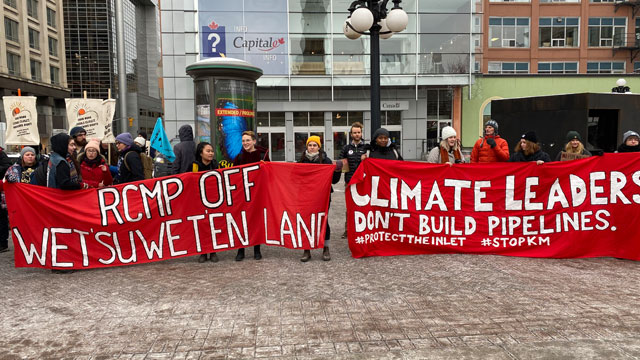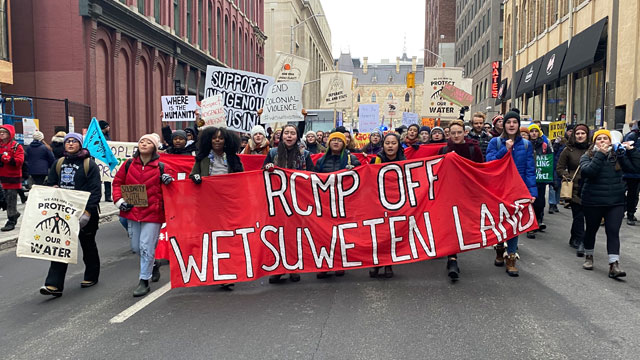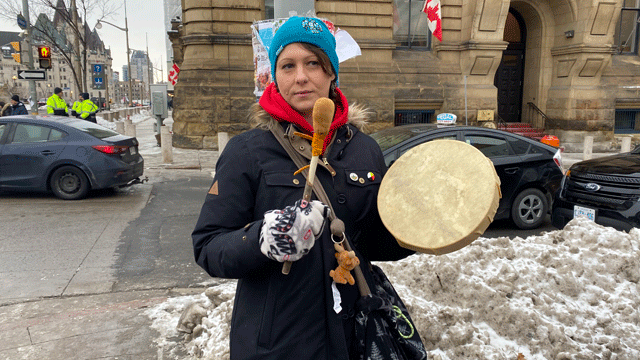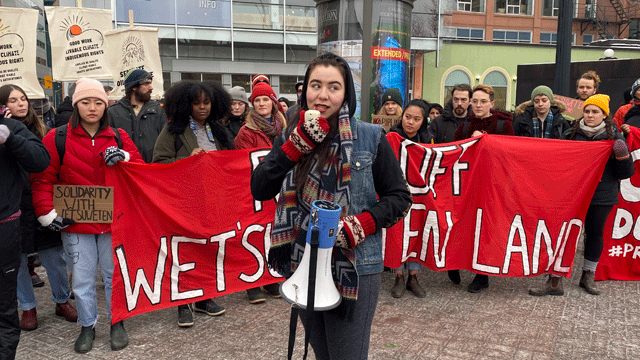

Brett Forester, Lindsay Richardson, Angel Moore
APTN News
Marches and demonstrations took place today in cities across Canada as part of an “international call to solidarity” issued by the Unist’ot’en Camp of the Wet’suwet’en Nation – and more are slated for the weekend.
Five Wet’suwet’en hereditary chiefs and their supporters oppose Coastal GasLink Ltd.’s (CGL) proposed $6.6 billion, 670-km pipeline that if completed would carry fracked natural gas across northern B.C. to a facility near Kitimat on the coast.
The company has what it needs from the province to continue construction, along with a new injunction to clear the way.
It also has benefit agreements with all 20 elected First Nations governments along the route.
The Unist’ot’en Camp fears a repeat of last year’s RCMP raid on the Gidimt’en checkpoint that saw 14 people arrested. That raid enforced an interim injunction. The new injunction was posted to CGL’s website Tuesday and gave pipeline opponents 72-hours to clear all obstructions.
Marching on the Streets of Ottawa
In the nation’s capital, roughly a hundred demonstrators marched west from Parliament Hill, passing the new Indigenous Peoples Building which sits right across the street.
Activists then delivered speeches in front of the World Exchange Plaza where the TD Bank is located. They moved down the road to the Royal Bank of Canada before completing their march at a makeshift campsite between the Prime Minister’s Office and the National War Memorial.
“I want to see them actually implementing the United Nations Declaration on the Rights of Indigenous Peoples, respecting Wet’suwet’en law – back off on their land, retract the permits of Coastal GasLink pipeline – and to stop using force. Leave the land defenders and First Nation to live,” said Vi Bui, an event organizer with Climate Justice Ottawa.
Bui’s group and three different activist organizations marched through the streets of downtown Ottawa, chanting slogans. They voiced support for members of the Wet’suwet’en nation that oppose CGL.

(Ottawa’s Natalie Lasalle drumming across from Parliament. Photo: Brett Forester/APTN)
Natalie Lasalle, a non-status First Nations woman from Ottawa, said it’s “quite frankly disgusting” that B.C.’s Supreme Court granted an interlocutory injunction authorizing the RCMP to use force once again to remove blockades and arrest anyone obstructing pipeline construction.
“That’s not right,” she said.
“Native people are people, we deserve equal treatment, we deserve the right to our land, we deserve the right to our water, and we deserve the right to peaceful protest.”
Pat Taylor said her group, Extinction Rebellion, pitched the “climate emergency camp” to pressure the government to act on the issue of climate change.
Even though the company has signed agreements with elected First Nations governments, Taylor told APTN News that this doesn’t constitute free and prior informed consent.
“That’s a colonial structure that they have permission from. That is not the recognized government of the Wet’suwet’en people, and they have been on that land for time immemorial,” Taylor argued.

(Mi’kmaw activist Sophia Sidarous. Photo: Brett Forester/APTN)
Sophia Sidarous, a Mi’kmaw woman living in Gatineau, addressed the assembled crowd through a megaphone.
“They’ve accepted UNDRIP, and they’ve said that this is the most important relationship with the government is nation to nation relationship,” Sidarous told APTN afterward.
“But right now we’re not treated as a nation. We’re treated as criminals and we’re constantly criminalized under Canada. So I would really like to see them put their words into effect.”
Beating the drum in Montreal
In Montreal, guided by the beat of Marlene Hale’s drum, dozens of students and supporters gathered near the gates of McGill University – breath visible in the cold air – to convey their solemn message.
Touting hand-painted signs saying “pas de pipelines” or “no CGL,” supporters at Friday’s event – which was organized by the university’s Indigenous Affairs student group – were given the opportunity to write messages of support on pre-addressed postcards to be sent to Unist’ot’en camp.
“[The government] still doesn’t get it, they still live under a rock,” Hale told onlookers. “If you stop all these pipelines, all this atrocity that is happening to the Indigenous people worldwide – you will make a difference.”
Hale, a chef living and working in Montreal, calls herself “the only Wet’suwet’en in Quebec.”
As an “accidental activist,” Hale was thrust into the public spotlight one year ago while questioning the Prime Minister Justin Trudeau at a town hall in Sainte-Hyacinthe, Que., about the standoff on her home territory.
Even now, a year after that encounter, Hale says little has changed.
“My address today is to Prime Minister Trudeau. Where the heck are you? Why aren’t you here looking after your people?” Hale shouted. “We got you where we are today. You need to come back and do your job.”
Other First Nations representatives were just as openly critical of Trudeau’s perceived inaction.
“We see the way the Canadian government is acting, and reacting to traditional people. Mr. Trudeau talks about his country being based around law and order, but he’s a good liar,” explained Louis Pronovost from Kahnawake Mohawk Territory.
“We see through their actions, they’re not honorable people. They’re not honorable leaders. They’re liars,” he added.
Which, for Hale, augments the anticipation – or apprehension – that a standoff may erupt between the RCMP and the land defenders gathered near the worksite.
“We pray that nobody is going to be hurt. We want them to put their guns down,” Hale said.
“This is what we hold for guns – feathers,” she added, gesturing to an eagle feather held by a nearby supporter. “How can you put that down with an assault rifle? On elders, on young people who are land defenders.”
“That’s all they were,” she added. “They were not criminals.”
Although not physically present during the gathering at McGill, Ghislain Picard, regional chief of the Assembly of First Nations for Quebec and Labrador, expressed his support and called the government’s previous “violent” arrests of community members “despicable.”
“It is frustrating and disappointing that the Government of Canada is once again committing to the principles of free, prior and informed consent on the one hand, but on the other hand, allowing projects without seeking to work with the First Nations directly affected by them,” Picard said in a statement.
“Clearly, no project will be viable if it is imposed by force on First Nations communities.”
“Canada’s been trespassing against First Nations…”
Mi’kmaq grassroots grandmothers and about 50 supporters rallied in Halifax.
Alton gas protestors led by the grassroots grandmothers braved the cold in Halifax.
Thunderbird Swooping Down Woman occupied a camp at the Alton Gas project site.
At the rally, Woman told the crowd corporations only care about money.
“They don’t care about the land, they don’t care about the water, and that’s the sad part about this and that’s why we have to stand out in this cold to make a point,” she said.
The battle against corporations is coast to coast.
Melissa Morrisseau said she was at the Kinder Morgan blockade in Vancouver in 2018.
“If we don’t show them who will, and we have to instill that pride back into them and show them that together we can do this,” said Morrisseau.
Morrisseau said she will continue to protect the land.
“Canada’s been trespassing against First Nations people forever and it has to stop, it has to stop now,” she said.










Victoria had perhaps 500-1000 people show up!
You are still biasing your reporting in favour of the Indian Act reserve CnCs. You are not making it clear that these Indian Act structures only have administrative Indian Act jurisdiction on reserves, and do not have authority to make “deals” affecting ancestral rights to vast unceded territories. Why do you seem to think that the Indian Act replaces traditional governance?
“Even though the company has signed agreements with elected First Nations governments”.
Governments of what and who?